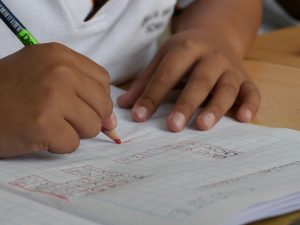Louise posted the following question on her Louise Nhm Smith profile “Good Afternoon Everyone. I’ve had a question from a NHM Reader that I’m intrigued to know the answer myself: “Has anyone advised their child’s school that their children won’t be doing homework in Infants school, and if yes, how did they go about doing this? My understanding is that homework isn’t mandatory until 8 years old…” TIA”
Thank you to all who contributed to this discussion, highlights are below and thank you to Juliet for putting this post together!
NHM Readers comments on advising infant /junior schools their children wont be doing homework
Jaz said
“We’re clearly lucky as my school doesn’t believe in it so young. We just have to read each day- but I think that’s right! They do have a project over the summer which I think is fine. But also- if it’s making a project or something you don’t want them to be the only child that doesn’t do it and is left out…”
Mary said
“My son is y1 and his homework is a short writing exercise (often draw a picture and write a sentence); practice tricky words, read his book and number bonds. I let him chose to do it when he wants to. It takes no time at all. The teacher says it’s ok if not everything gets done. If I were you I would open the conversation with the school in an open and honest way. You might find they are open to your choice. Plus think about what aspects of homework you won’t do. Be prepared.”
Louise Nhm Smith said
“I have already had this response from a Primary school teacher who obviously wishes to remain anonymous: “I’m currently a Primary school teacher and when my little boy goes to school I will be doing the same and probably withdrawing him from KS1 SATs.
I would write a clear polite letter outlining why you do not want your child doing homework, inc references to official sources to support your view if you think the school will cause a fuss. I would also include what educational activities you will do i.e. read and discuss books, family meals, visits to places that engage your child (whatever is relevant to you). Speak to your child so they don’t rub it in to others and keep track that they are not doing it in break times.
I would however keep an eye on the projects because they can be fun for the family to share in and be aware they may miss out on rewards (merits, stickers). Good luck and I hope the school supports your plans.””
Louise Nhm Smith said
“Response from the same Primary school teacher: “After a very quick google search, there is no formal method to withdraw an able child from SATs that I can find. There is an option to simply not take them in during the week (and risk fines) or take them on an unauthorized holiday (less likely to get fines but as you will have seen in the press it is a hot topic).
From my personal perspective my boy is not due to take KS1 SATs until 2022 and a lot will change in that time. If they do not then I will have a conversation with my school about my concerns, and if not addressed, will consider not sending him in and taking the penalties/fines.
I have a lot of professional concerns about how schools are implementing the tests, especially at KS1 and the pressure that is put on very small minds, bodies and souls.
If you as a parent also have concerns your first port of call should be your child’s teacher. Understand how the school approaches the tests and discuss how your child can be supported so that they are not stressed. If this does not reassure you, I would go to the head as the ethos of a school can shape the exam experience. If you are still not happy you need to reflect on your options. The sad fact is that if you simply withdraw your child for the test week, they will still be taught as if they are sitting them and the stress that might bring. It’s a really hard thing to address and most schools have their hands tied and so (unfairly) pile the pressure on the children.
If you feel the pressure is affecting their mental health (scary at such a young age) or their love of learning/school, then I would bring that to the school’s attention asap. Always be polite and provide evidence: from language used at home (‘I hate school’, ‘I’m not doing well’, ‘I’m not good enough’), examples from work in school, sleep patterns etc. Explain that you are not happy that the year has become about a set of tests when they should be loving learning and see how the school respond.
If you have concerns you could always talk to the LEA to see what they’d expect in a year 2 class. Or consider changing school/home-schooling.
This is not in any way official, just the reflections of a mum who also teaches.””
Susan said
“My child is 5 (year 1) and has reading and maths and now spelling homework (10 words a week) and also “talking homework” but saying that the school is outstanding!!”
Emily said
“Yes. But it took my son’s paediatric consultant saying it three times before they listened…”
Louise Nhm Smith said
“A response from an assistant head at a local junior school who also wishes to remain anonymous: “Homework is not a statutory requirement in infant or junior schools in England. I am not sure it is statutory in KS3 but don’t quote me. However, parental involvement proven to be crucial in child development. There is no set definition of what parental involvement constitutes and it certainly isn’t restricted to ‘formalised homework’.
Many schools have project/topic related homework that is designed to encourage families to share in activities for those who wish to do it and many schools are more than happy to pinpoint parents to the right place to find suitable additional home learning tasks. However, this is again non-statutory.
Personally, as a teacher and a Mum, I do value reading at home (even if that comes in the simple form of a bedtime story). Spelling and multiplication tables/number facts are also areas that can make an impact.
The Sutton Trust report rated homework as having very little impact on children’s progress at school. However, parental involvement is paramount! Parents should feel confident in making a judgement about whether their child actually benefits from homework and schools will respect this if the child is generally supported by their parents in their learning.
By the way…homework is always a nightmare topic at parents evening because it generates such conflicting opinions. It’s very difficult for schools to please everyone on this one.””
Mata said
“Interesting it is not ‘statutory’ in Juniors. I wonder if that means the school does not have to set it or does it mean the child does not have to do it? My daughter’s school give them detention if it’s not done. Tried complaining but it’s hopeless.”
Karen said
“Only an education is statutory. How it is delivered is up to the parents. If you can’t find a school whose ethos you like or can negotiate with don’t forget home education is a perfectly allowable method of delivering education with no constraints on your curriculum or time.”
Don’t miss out on future posts like this – you can receive updates directly to your inbox by email by adding your email address to the box on the top right of this page and hitting subscribe. You can also follow NorthHantsMum onTwitter,Facebook Page, Facebook Profile, LinkedIn and Feedly. I hope to see you there!





